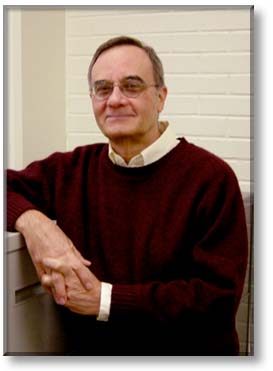 |
What is Narrative Social Research and What is it Good For? Tuesday, November 11, 2008 Noon 134 Varner Hall Oakland University |
| The Educational Imaginary and the Ethics of
Narrative Research Tuesday, November 11, 2008 6pm 134 Varner Hall Oakland University |
|
| About the Speaker (View Dr. Barone's CV) Tom Barone is a Professor of Education at Arizona State University. Nearly 30 years ago, Barone’s dissertation at Stanford University investigated the possibilities of literary non-fiction for researching and writing about educational matters. Since then he has explored, conceptually and through examples, a variety of narrative and arts-based approaches to theorizing about and contextualizing significant educational issues. Barone is the author of Aesthetics, Politics, and Educational Inquiry: Essays and Examples and Touching Eternity: The Enduring Outcomes of Teaching. He is currently co-authoring a book with Elliot Eisner of Stanford University entitled Imagination and Method: Arts-Based Forms of Qualitative Research. Barone teaches courses in curriculum studies and qualitative research methods in the Arizona State University Mary Lou Fulton College of Education. |
|
Sponsored by
![]()
College of Arts and Sciences
Oakland University Department of Music, Theatre & Dance
Oakland University School of Education and Human Services
A generous gift from an anonymous alumni donor
view poster
campus map
Directions to Oakland University
Recommended Reading
Barone, T. (2000). Ways of being at risk: The case of Billy Charles Barnett. In T. Barone (Ed.), Aesthetics, politics, and educational inquiry: Essays and examples. New York: Peter Lang.
Barone, T. (2001). Touching eternity: The enduring outcomes of teaching. New York: Teachers College Press.
Behar, R. (1996). The girl in the cast. In R. Behar (Ed.), The vulnerable observer: Anthropology that breaks your heart (pp. 104-132). Boston: Beacon Press.
Ben-Peretz, M. (1995). What do the stories tell us? Learning about teachers and teaching. In Learning from experiences: Memory and the teacher’s account of teaching (pp. 75-93). Albany: State University of New York Press.
Casey, K. (1993). A signifying discourse of black women teachers working for social change. In I answer with my life: Life histories of women teachers working for social change (pp.107-153). New York: Routledge.
Coulter, D. (1999). The epic and the novel: Dialogism and teacher research. Educational Researcher 28(3): 4-13.
Ellis, C. (2003). The call of ethnographic stories. In The ethnographic I (pp. 24-57). Walnut Creek, CA: AltaMira.
Goodson, I. (1995). The story so far: Personal knowledge and the political. In J. Hatch and R. Wisniewski (Eds.), Life history and narrative (pp. 89-98). London: Falmer Press.
hooks, b. (1994). Narratives of struggle. In P. Mariani (Ed.), Critical fictions: The politics of imaginative writing (pp. 53-61). Seattle, WA: Bay Press.
Lather, P. (1997). Creating a multilayered text: Women, AIDS, and angels. In W. Tierney and Y. Lincoln (Eds.), Representation and the text: Re-framing the narrative voice (pp. 233-258). Albany: SUNY Press.
Richardson, L. (1997a). Louisa May’s story of her life. In Fields of play: Constructing an academic life (pp. 131-135). New Brunswick, NJ: Rutgers University Press.
Richardson, L. (1997b). The poetic representation of lives. In Fields of play: Constructing an academic life (pp. 139-144). New Brunswick, NJ: Rutgers University Press.
Sparkes, A. (1996). The fatal flaw: A narrative of the fragile body-self. Qualitative Inquiry 2(4): 463-94.
Tanaka, G. (1997). Pico College. In W. Tierney and Y. Lincoln (Eds.), Representation and the text: Re-framing the narrative voice (pp. 259-299). Albany: State University of New York Press.
Tierney, W. (1993). Self and identity in a postmodern world: A life story. In D. McLaughlin and W.G. Tierney (Eds.), Naming silenced lives (pp. 119-134). New York: Routledge.

Oakland University, Kresge Library
2200 N Squirrel Rd., Rochester, MI 48309
(248) 370 - 4426
